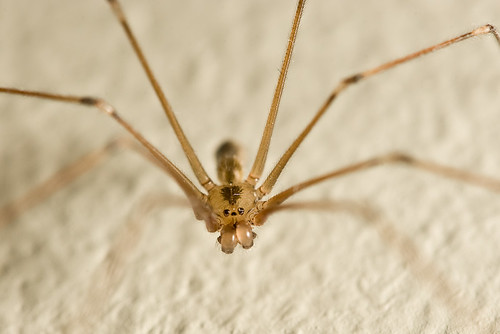Cellar Spiders
When I think of spiders I typically think of either the orb weaver spiders with their beautiful webs or tarantulas and trapdoor spiders that line burrows with layers of silk. Comparatively the cellar spider's web is a downright mess, lines going every which way, no order, random chaotic (hmmm...a bit like my desk!).
The time of year has come in New England for the cellar spiders of the family Pholcidae to show up in the house. A family with some 1000 species and a truly worldwide distribution these spiders are often referred to as "daddy long legs" which Christopher explains is an absolutely useless name since it is applied to many diverse groups of animals including our friends the harvestmen, which Christopher explains is . The one above is the Longbodied Cellar Spider (Pholcus phalangioides). This one was drunkenly admiring the art, but when the paparazzi attacked it decided to take a break from visual arts and engage in some culinary arts hiding behind the recipe books in the kitchen.
I say "drunkenly" since when these spiders walk about on the floor they often bob and weave as if they are one of the late night drunks headed past my house on a Saturday night. Their walk is not the only interesting motion of theirs. If disturbed in their webs they will begin vibrating wildly, seeming to dance. It does make them at times hard to track so I can see where this would work as a defensive maneuver.
Anyone know the meaning of "phalangioides"?
Classification for Ctenocephalides felis
- Kingdom
- Animalia
- Phylum
- Arthropoda
- Class
- Arachnida
- Order
- Araneae
- Family
- Pholcidae
- Genus
- Pholcus
- Species
- Pholcus phalangioides





















world fingers?
ReplyDeleteFrom the latin "phalanx" or "phalanges", and the greek "geos"?
I think the suffix "oides" means something to effect of "similar to". So maybe in this case phalangioides means "similar to a finger". Maybe Christopher can correct us on this one.
ReplyDeleteI have to admit, spiders are not my favorites. And long legged spiders are right at the bottom of the list!
ReplyDeletePhalangium opilio is the most widespread Palaearctic harvestman. So phalangioides means "similar to Phalangium".
ReplyDeleteThe word "phalangium" itself is a Latin name for an unspecified variety of toxic spider.
That is a latin suffix I'll have to remember.
ReplyDeleteWait, Phalangium refers to both a harvestman genus and a group of true spiders?
I can sympathize with your discomfort with spiders BQ, my mother was bitten by a brown recluse when she was young and was scared of spiders from then on, imagine her horror when we were living in the Arizona Desert and she had taratulas crawling up the screen door. Or when we were in Texas and I would come home with tarantulas I had "fished" out of burrows crawling on my arms. She really was great not to freak, and even encourage more.
Wait, Phalangium refers to both a harvestman genus and a group of true spiders?
ReplyDeleteWell, I don't know the context in which the classical word "phalangium" was used, so I don't know if the ancient Romans even distinguished spiders and harvestmen. For that matter, when Linnaeus first established the genus Phalangium it included species of a number of other arachnids, such as whip scorpions and amblypygids, as well as harvestmen, and it wasn't until latter that it was whittled down to its current interpretation.